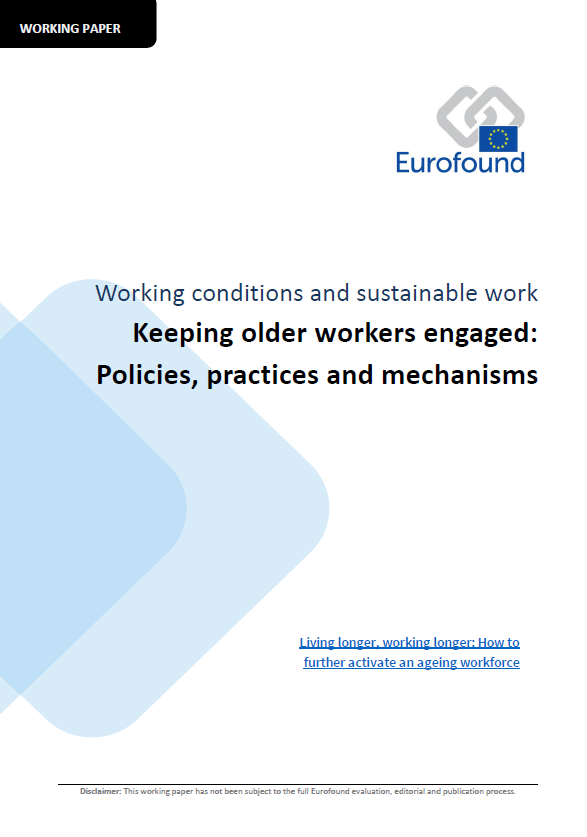EU context
Aj napriek tomu, že miera zamestnanosti starších vekových skupín za posledné desaťročie v mnohých krajinách EÚ výrazne stúpla, Európska komisia v spoločnej správe o zamestnanosti z roku 2017 zdôrazňuje potenciál na jej ďalšie zvyšovanie. V roku 2016 miera zamestnanosti starších zamestnancov vo veku 55 – 64 rokov v EÚ dosahovala 55,3 %, pričom pre všetkých ľudí vo veku 15 – 64 rokov to bolo 66,6 %. Najväčší nárast sa zaznamenal medzi staršími ženami.
Európsky pilier sociálnych práv poskytuje rámec, ktorý má pracovným trhom pomôcť prispôsobiť sa novým požiadavkám, no pritom aj naďalej zachovávať spravodlivosť a solidaritu medzi generáciami. Zdôrazňuje právo na pracovné prostredie prispôsobené profesionálnym potrebám pracovníka, ktoré mu má umožniť predĺžiť si účasť na trhu práce. Okrem toho sa európski sociálni partneri v nedávnej autonómnej dohode týkajúcej sa aktívneho starnutia a medzigeneračného prístupu zaväzujú, že starším pracovníkom uľahčia aktívnu účasť a dlhšie zotrvanie na trhu práce.
Práca nadácie Eurofound
Nadácia Eurofound sa dlhodobo zameriava na problémy, ktorým čelí starnúca pracovná sila. Výskum od 90. rokov 20. storočia sa sústreďuje na účasť na trhu práce, výkon práce, pracovné podmienky a pracovné preferencie starších pracovníkov v kontexte politiky meniaceho sa demografického profilu Európy. Úsilie sa zameriava aj na verejnú podporu a iniciatívy na úrovni spoločnosti, ktorými sa podporuje zamestnanosť starších pracovníkov. Skúma sa aj skupina starších pracujúcich žien, v prípade ktorej sa zdôrazňuje stúpajúca miera zamestnanosti a nárast podielu v rámci pracovnej sily, a to najmä vo vekovej kategórii 55 – 64 rokov.
Údaje z prieskumu
Z hlavných prieskumov nadácie Eurofound vyplýva množstvo údajov o situácii starších pracovníkov. V šiestom Európskom prieskume pracovných podmienok (EWCS) sa skúma porovnanie starších pracovníkov vzhľadom na rôzne aspekty kvality práce. Hoci pravdepodobnosť, že zostanú nezamestnaní, je pri starších pracovníkoch menšia ako pri mladších, údaje ukazujú, že starší pracovníci majú pocit, že keby prišli o prácu, novú a podobne platenú by si už nenašli, a opätovný vstup na trh práce dokonca považujú za náročný.
V štúdii založenej na piatom Európskom prieskume pracovných podmienok (EWCS) nadácie Eurofound sa sledujú charakteristiky staršej pracovnej sily a práca v rôznom veku, ako aj na faktory, vďaka ktorým je práca pre starnúcu pracovnú silu udržateľnejšia: dobré pracovné podmienky, fyzická a duševná pohoda a rovnováha medzi pracovným a súkromným životom.
Z Európskeho prieskumu kvality života nadácie Eurofound (EQLS) vyplývajú vo vzťahu k rôznym aspektom kvality života v Európe zistenia súvisiace s vekom. Analýza pracovných preferencií po veku 50 rokov vychádza zo zistení tretieho prieskumu EQLS a vyplýva z nej, že mnoho starších pracovníkov preferuje kratší pracovný čas, pričom úlohu zohrávajú aj ich finančné potreby. Uľahčenie možnosti zosúladenia pracovného času s preferenciami môže umožniť ľuďom pracovať dlhšie a zároveň ich aj k tomu motivovať.
Dlhší pracovný život
Nedávno sa nadácia Eurofound spojila s tromi ďalšími agentúrami EÚ a spoločne skúmali prácu vhodnú pre starších ľudí v Európe, požiadavky na politiku týkajúce sa starnúcej pracovnej sily a inovatívne riešenia.
Mnohí pracovníci nie sú schopní alebo motivovaní pracovať až do zákonného veku odchodu do dôchodku. Nájdu sa však aj takí, ktorí sú schopní a ochotní pracovať aj dlhšie. Nadácia Eurofound skúmala tento narastajúci trend práce po odchode do dôchodku.
V nedávnom výskume sa sledovalo predĺženie pracovného života prostredníctvom pružných systémov odchodu do dôchodku a najmä systémy čiastočného odchodu do dôchodku, ktoré ho môžu uľahčiť. K predĺženiu pracovného života môžu prispieť aj hodnotenia uprostred kariéry. Vo výskume sa sledovalo aj to, ako je možné pomôcť objasniť možnosti pracovníkov na zotrvanie v práci až do neskoršieho dôchodkového veku. Bolo poukázané na rôzne nástroje, ktoré si krajiny vyvinuli, aby neprišli o starších pracovníkov.
V inom výskume sa zas dokumentujú vnútroštátne a sektorové iniciatívy vlád a sociálnych partnerov vrátane finančných stimulov a zlepšených podmienok, ktoré majú pomôcť udržať starších pracovníkov na trhu práce. V skoršom projekte sa analyzovali iniciatívy na riadenie otázok týkajúcich sa veku zavedené pred recesiou aj po nej, aby sa zdôraznili osvedčené postupy v spoločnostiach v Európe.
Zdroje
























